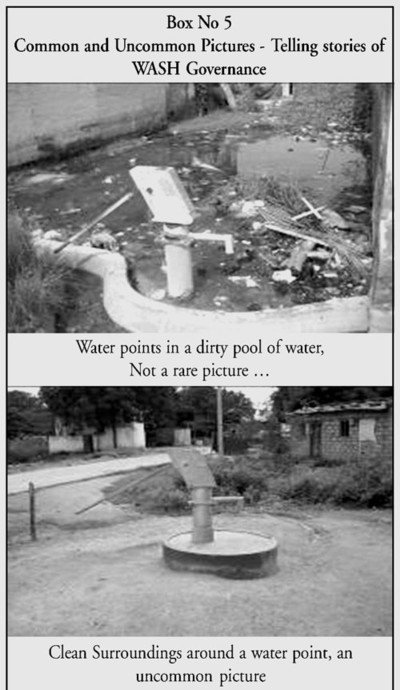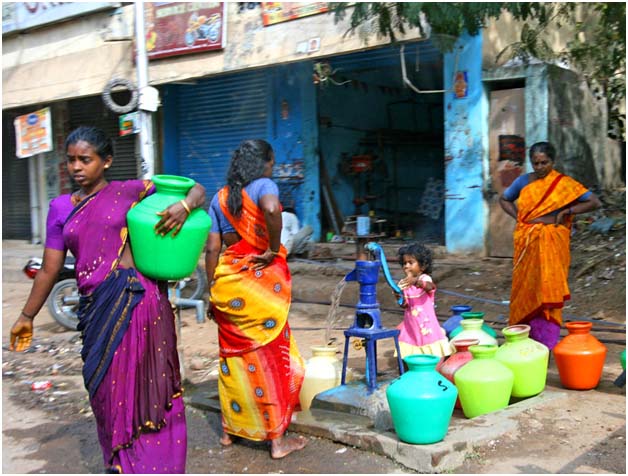Treatment and Purification
An ecological quantification of the relationships between water, sanitation and infant, child, and maternal mortality - Paper published in the Journal Environmental Health
Posted on 21 Feb, 2012 03:30 PMA number of studies have made associations between prevention of disease burden among populations by improving water supply, sanitation, hygiene and management of water resources and between poor water quality and disease burden.
Impacts of climate change on public health in India - Future research directions - Paper published in Environmental Health Perspectives
Posted on 19 Feb, 2012 11:00 PMThis paper published in the journal Environmental Health Perspectives reviews the current state of the science relevant to the 2009 Joint Indo–U.S. Workshop on Climate Change and Health that was held in Goa, India, and, then discusses the observed relationships between climate variability and human health specifically in relation to the Indian subcontinent, highlighting future research directions.
The paper briefly summarises relevant literature on the impacts of climate change in India and touches upon the opportunities and significant challenges associated with designing, initiating, and conducting research, as well as pursuing related public health programming to improve public health infrastructure in the face of climate change. The paper argues that such research is needed to pave the way for unique and pioneering solutions that can improve public health in the face of increasing climate variability.
Understanding governance in WASH sector in Andhra Pradesh - A study by WASSAN
Posted on 18 Feb, 2012 03:38 PMProblems in the water, sanitation and hygiene (WASH) sector have their roots in socio-political issues rather than in technology. This paper presents the report of a survey in 107 villages in rural Andhra Pradesh to illustrate the influence of governance systems.

"Water management in Mumbai: Prospects and challenges" - Videos from a round table organised by Observer Research Foundation
Posted on 16 Feb, 2012 03:51 PMThese four films include details of speeches made by the Municipal Commissioner of Brihan Mumbai Municipal Corporation (BMC), Mr Swadhin Kshatriya, who delivered a valedictory speech and Mr Sandeep Acharya, senior journalist from Loksatta, who expressed his views on the water crisis in Mumbai, as a part of a round table organised by Observer Research Foundation (ORF), on "Water management in Mumbai: Prospects and challenges", on the 10th of January 2010.
Stress of urban pollution on largest natural wetland ecosystem in East Kolkata - Causes, consequences and improvement
Posted on 14 Feb, 2012 10:23 AMThe impact of sewage pollution on these fish ponds and on the ecosystem is evaluated. Similarly, remedial measures to maintain water quality and to improve resource recovery efficiency are suggested.
PSGS invites applications for Smart Pot Water Challenge – Apply by April 2, 2012
Posted on 11 Feb, 2012 09:36 AM![]()

The Patel School of Global Sustainability (PSGS) fosters sustainable urban communities and environments through collaborative research, education and community involvement. Its research generates innovations and new knowledge that will help cities around the world, including those in developing countries, to reduce their ecological footprint, while improving their form and function to make them healthier, more livable and resilient. Through its research, PSGS influences global practice and policy and has become the hub of a global network of sustainability experts.
"Bottle it up: We can use it" - Scientific studies on human urine - A presentation by Arghyam
Posted on 10 Feb, 2012 11:13 AMThis presentation by Arghyam includes the results of doctoral study done by G Sridevi under the guidance of Prof.
Safe water dissemination workshop by PATH held on January 19-20, 2012 at New Delhi
Posted on 07 Feb, 2012 10:15 PMGuest post: Amita Bhaduri
Through the Safe Water Project, it is seeking complementary solutions to sustainability and scale-up by exploring the potential for commercial enterprises to produce, distribute, sell, and maintain Household Water Treatment and Storage (HWTS) consumer products to low-income populations. The workshop shared learnings and tools from PATH’s Safe Water Project and presented the experiences of other organizations that are leveraging market-based approaches to achieve a sustainable public health impact.

Water quality monitoring of lakes in and around Bangalore city
Posted on 07 Feb, 2012 03:05 PMIt describes the efforts undertaken by the Karnataka State Pollution Control Board to launch a programme to monitor the water quality of some of the lakes in Bangalore so as to focus the attention of concerned governmental organisations to take up remedial measures to safe guard the water bodies of the "Garden City".
The sources of pollution in lakes are mainly identified as:
Nutrient-based fertiliser subsidy: Will farmers adopt agricultural best management practices? An article in EPW
Posted on 06 Feb, 2012 11:58 AMIt offers prospective benefits from the agro-environmental management point of view.





